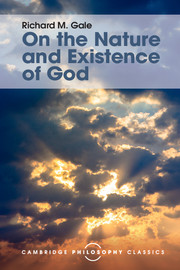Book contents
- Frontmatter
- Dedication
- Contents
- Preface to this edition
- Acknowledgments
- Introduction
- Atheological arguments
- 1 Atheology and the nature of God
- 2 The creation–immutability argument
- 3 The omniscience–immutability argument
- 4 The deductive argument from evil
- 5 The argument from world-relative actuality
- Theological arguments
- Index
3 - The omniscience–immutability argument
from Atheological arguments
Published online by Cambridge University Press: 05 July 2016
- Frontmatter
- Dedication
- Contents
- Preface to this edition
- Acknowledgments
- Introduction
- Atheological arguments
- 1 Atheology and the nature of God
- 2 The creation–immutability argument
- 3 The omniscience–immutability argument
- 4 The deductive argument from evil
- 5 The argument from world-relative actuality
- Theological arguments
- Index
Summary
This argument's initial set is composed of these three propositions:
1. God essentially knows all and believes only true propositions;
2. God essentially does not change from one time to another in respect to any nonrelational property; and
3. There are true temporal indexical propositions (to be called “A-propositions”) to the effect that certain events and/or times are now past, present, or future.
Theism's commitment to 1 and 2 results from its conceiving God to be essentially both omniscient and immutable; and it is committed to 3 because, as pointed out in the previous chapter, theism (at least as represented by Judaism and Christianity) is a historically rooted creed that accords not only reality but significance to the sort of A-facts over which 3 quantifies, such as that the world came into being in the past,has reached a certain stage in its spiritual development at present,and awaits a future day of judgment.
The qualification on God's omniscience, that he believes only true propositions, which will be dropped in the future for the sake of brevity, is due to our not wanting to allow an omniscient being to go around having any false beliefs, even if he does know every true proposition. Notice that an omniscient being must not only know of every true proposition that it is true but must also know every true proposition. As we shall see later in this chapter, these are not the same, since one could know that some proposition is true without knowing it.
The reason for the restriction of God's immutability to nonrelational properties, in which a nonrelational property is one that an individual could possess even if there were not to exist any other nonuniversal particulars, save for spaces and times, is to escape such “Cambridge” changes in God as being thought about by Jones at one time but not at another, herein the change being in Jones rather than in God. How the argument proceeds from here depends on whether it has as its target the timelessly eternal God of St. Augustine or the omnitemporally eternal God of the Bible, that is, a God that endures throughout a beginningless and endless time and logically could not begin or cease to exist.
- Type
- Chapter
- Information
- On the Nature and Existence of God , pp. 47 - 81Publisher: Cambridge University PressPrint publication year: 2016

